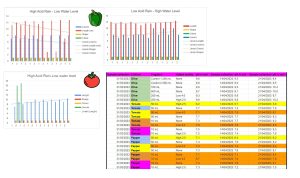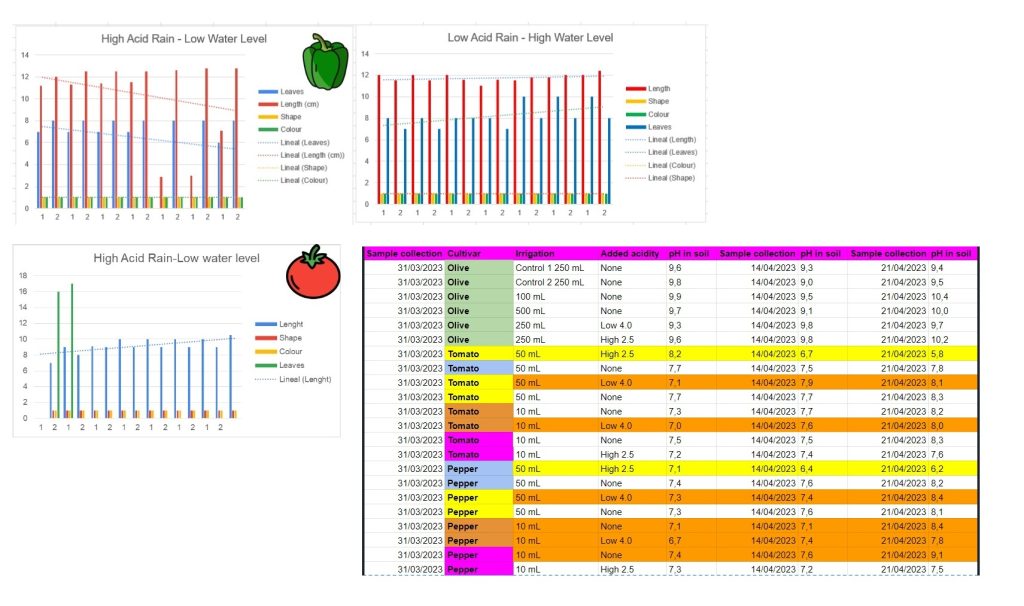Climate Detectives Projects 2022-2023
Project title: Study of extreme climate changes on cultivars
Team: CROP DETECTIVES
IES SANTISIMA TRINIDAD Baeza Spain 16 Student’s age: 14-15 years old, 16-17 years old
How climate changes affect cultivars growth?

In recent years, extreme weather conditions suffered in our region (such as the droughts, floods, or extreme oscillations in temperature) have affected the most important crop in our region: the olive grove.
Due to the complexity of the cultivar, we studied the effects of extreme climate changes in a controlled environment with much simpler crops as well, such as green pepper and tomato, also common in the region.
Through this study the students evaluated the impact of limiting factors such as water and soil acidity by observing and tracking the evolution of the state and growth of the plants (coloration of the plant, desiccation of the leaves and evolution of the size of the plant)
As a part of the study we proposed to built a smart greenhouse, that could detect the level of humidity of the plants and water them according to predefined parameters.
Simulated acid rain conditions: Sulphuric acid was added to tap water (pH 8.0) to prepare acidic solutions of pH 4.0 and 2.5.
Procedure to measure acidity in soil: 0.5g of soil sample dissolved in 20 mL distilled water (olive tree cultivar) 0.1 g of soil sample dissolved in 20 mL distilled water (tomato and pepper cultivars) The diluted sample is measured with pHmeter and pH test strips.
Irrigation conditions: For tomatoes and green peppers: Low water (10 mL), High Water (50 mL); Low water & low acidity (10 mL, pH= 4.0), high water & high acidity (50 mL, pH=2.5) For olive trees: Low water (100 mL),High water (500 mL), high acidity conditions (250 mL, pH=2.5), low acidity conditions (250 mL, pH=4.0)
Irrigation was done manually every Monday, Wednesday and Friday during the research, while building the automated prototype.

Variation in water level: There was a major capacity to drought resistance in olive trees because the growth of this plant has been greater than the others irrespective of the treatment applied. Pepper plants were the worst for drought conditions due to the death of all plants when they have come across with low water levels. In tomato plants, there was no significant difference between low and high water levels despite the fact that not all individuals managed to survive. There were no registered changes in color or leaves shape in any plant species and type of treatment either.
Variation in acid rain: Apart from fatal results in pepper plants due to variation in water level, we observed a good resistance and growth of this species in both acid rain conditions. In the case of tomato and olive plants there was a slight decrease in growth and number of leaves as a consequence of high acid rain. Nevertheless, it will be necessary to study more to determine a safer conclusion.
Impact of the acid rain on the soil: We registered just two clear cases of acidification of the soil in two of the plants irrigated with high acidity water, and, surprisingly, an important number of the plants increased the pH of the soil, meaning this a slight basification of the medium.
One of the main environmental problems observed this year in our region is the drought caused by extreme temperatures and lack of rain. The use of smart irrigation could improve the amount of water used, taking into account that it is able to detect the level of humidity and irrigate the cultivars according to their actual needs.
To prevent the effects of low water levels, erosion caused by draughts and the impact of acid rain on cultivars’ soil, the use of a plant cover would be recommended. This plant cover would ideally be local, non competing species. One good idea is to recover our great grandparent’s practice: using the space among olive trees to cultivate garden vegetables, such as tomato, pepper, lettuce, wild artichokes, green beans, aubergine, etc. According to our research, tomato could be an ideal candidate due to its resistance to extreme conditions of temperature, irrigation and acid rain.
Climate-detectives-research-summary.pdf
Projects are created by the teams and they take the full responsibility of the shared data.
← All projects




